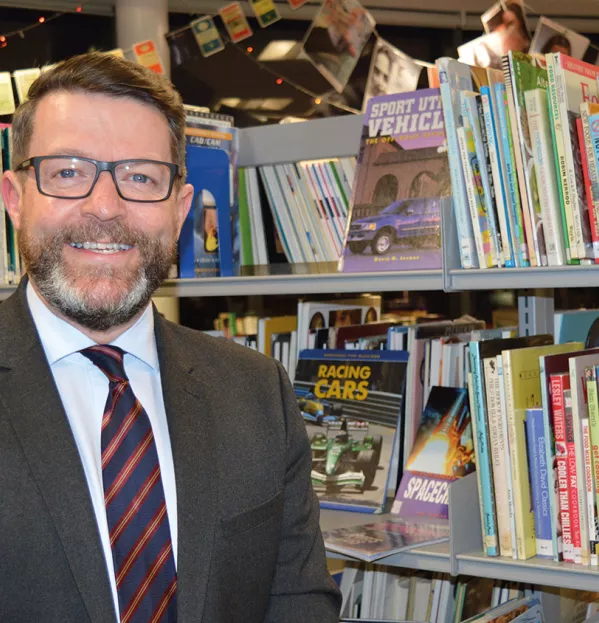Teachers are ‘becoming a bit weary of change’

If schools don’t have enough money and teachers, all bets are off when it comes to educational improvement. David Barnett is too measured a character to put it in quite such blunt terms. But the new School Leaders Scotland president peppers conversation with reminders of the stark realities facing teachers.
Speaking at the recent SLS annual gathering at Loch Lomond, he warned that local authorities were now so squeezed that education could no longer rely on the special protection it had often been afforded.
It is a warning he repeats when talking to Tes Scotland. “If some of the forecasts prove to be as bad as they are at the moment, we’re going to see ourselves in a position where the quality of the curriculum…could be directly affected by cuts that will have to be made to staffing numbers.”
Barnett has seen warning signs that local authorities will no longer protect education from the worst ravages of budget cuts; this “will inevitably lead to there being fewer teachers employed in schools and therefore less subject choice for young people”.
An inevitable knock-on effect, he says, is that it would become harder to close the attainment gap - an issue upon which the government has staked its reputation.
The biggest town in Moray, Elgin, accounting for about a quarter of the authority’s population, should be experiencing less severe recruitment problems than rural areas, says Barnett.
But last month the council warned that a “grave” shortage of teachers might result in primary pupils attending school part-time; and Elgin Academy is not immune either, having been unable to fill a modern languages post despite four rounds of advertising.
Recruitment difficulties are one reason why Barnett can see potential positives in the government’s controversial “regional improvement collaboratives” - if they lead to support for subject teachers from specialist advisers like those who once worked across the sprawling old regions of Scotland. “That would be a very welcome development,” he says.
More generally, in these tough financial times, Barnett sees a strong argument for forging links across council boundaries. “We have schools and local authorities who are actually quite close geographically, but never really get the chance to work together. Anything that improves those kind of options has to be welcomed,” he says.
Barnett cautions, however, that “there are a lot of unknowns about how it’s all going to work”, adding: “We don’t want it to be another layer of accountability…There is already enough accountability for heads at the moment.”
He is also in two minds about the “massive issue” of the headteachers’ charter that promises to devolve unprecedented amounts of power and responsibility to school leaders. Barnett sees the “key test” being whether heads “become leaders of learning even more so than they currently are”.
He thinks there should ideally be a business manager in every school, to ensure that heads do not instead become bogged down in “the bureaucracy of managing budgets and so on”.
“It’s really important that there are staff there who can do that type of work to allow headteachers and deputes the freedom to be much more involved in directing learning and teaching…rather than spending time looking at spreadsheets and juggling figures,” he says.
A teacher since 1991 and a head for more than a decade, thinking back on his career now, Barnett can recall no precedent for the challenges currently facing the profession. “I don’t think people can remember a pace of change quite like it,” he says. “There is a danger that the profession is becoming a bit weary of change.”
‘Grave’ staffing shortfall
But some change in the past 27 years has been for the better, he adds, with schools now far more inclusive and no longer fixated on the success of academic high-fliers to the detriment of others.
“The range and type of support for young people - and our awareness of their needs - has improved hugely,” says Barnett, but with a caveat: “We hope that potential budget cuts aren’t going to affect that too much.”
Despite the gloom gathering around schools as they struggle for staff and resources, Barnett still believes teaching is “the best job in the world” and that more should be done to talk up the profession.
“It’s a huge privilege to be able to influence and guide young people,” he says. “When you see that little lightbulb moment, when you see a pupil that’s struggled to understand something and, through your help, the penny suddenly drops - that’s a hugely rewarding moment for any teacher.”
And, on a lighter note, teaching also provides rewards - and a swagbag of great stories - during moments when the lightbulb hasn’t quite sparked into action. Barnett has one such example from a recent school trip: “We were on a train from Birmingham Airport to the city centre when one of the pupils said to me, ‘Mr Barnett, it’s pitch black out there’ - and I had to reply, ‘Jamie, that’s because we’re in a tunnel.’”
You need a Tes subscription to read this article
Subscribe now to read this article and get other subscriber-only content:
- Unlimited access to all Tes magazine content
- Exclusive subscriber-only stories
- Award-winning email newsletters
Already a subscriber? Log in
You need a subscription to read this article
Subscribe now to read this article and get other subscriber-only content, including:
- Unlimited access to all Tes magazine content
- Exclusive subscriber-only stories
- Award-winning email newsletters